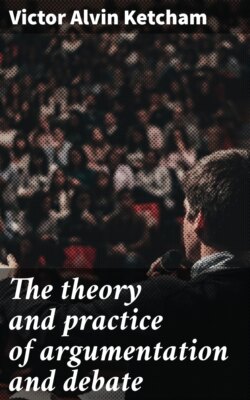Читать книгу The theory and practice of argumentation and debate - Victor Alvin Ketcham - Страница 50
На сайте Литреса книга снята с продажи.
1. The evidence must come from the most reliable source to which it can be traced.
ОглавлениеAll the evidence collected must have back of it some reliable source, as indicated in the discussion of Sources of Authority. The more trustworthy this source the more valuable is the evidence and the greater the weight given to it. Therefore “the evidence must come from the most reliable source to which it can be traced.” Every fact offered in evidence comes from some definite source. If this source cannot be found the fact should be discarded as worthless. To illustrate, in the investigation of a subject, a fellow-student may know some fact which is a most important piece of evidence in your favor. He may tell you about this fact, but you would not think of going into the debate and quoting one of your fellow-students as authority. Therefore you will at once ask the student from what source he obtained knowledge of the fact. He may reply that he has seen it in a newspaper article. But since a newspaper is usually of little value as an authority, you cannot rely upon its statement. Therefore you inquire from what source the newspaper obtained it. By consulting the newspaper it is found that the statement is made in an editorial which comments upon an article found in the North American Review. You must then consult the number of the North American Review to which reference is made. This is fairly reliable, and anyone would feel justified in quoting it as the source of his evidence, although he would not feel justified in quoting the statement of a fellow-student or the statement of a newspaper.
If the statement is one which is an opinion of the editor of the North American Review, or if for any other reason it cannot be traced back of this source, North American Review, volume and page, should be quoted as the source of the evidence. But suppose that the statement can be traced to its original source. To be more concrete, let us assume that the statement is to the effect that there is a surplus of over one million dollars in the United States treasury. For such a statement the North American Review is not the most reliable source. In this case the most reliable source is the Report of the Treasurer of the United States, which can be found in almost any library. When this fact is located the student should make an exact statement of the amount of the surplus and refer to the Report of the United States Treasurer.
Thus the fact to be used is traced through the statement of a fellow-student, through the editorial in the newspaper, through the article in the North American Review, back to its original and trustworthy source—the Report of the Treasurer of the United States. In this manner every fact presented must be traced to its most trustworthy source. In quoting the opinions of individuals the same principle should be applied. The greater the learning, ability, and reputation of the person quoted, the greater is the weight attached to his opinions.
In almost every branch of human endeavor and in every field of knowledge there are a few men who possess especial ability. By common consensus of opinion these men are regarded as authorities and their statements of fact or judgment are accepted as the most trustworthy. For example, the statements of Ely, Seligman, and Seager in the field of economics, and the statements of J. P. Morgan, and Andrew Carnegie in the field of industry and finance, are regarded as good authority. In chemistry the statements of Dr. Ira Remsen would be considered good, while in regard to psychology one could do no better than to quote the opinions of Hugo Münsterberg. Regarding the wireless telegraph, Marconi would be the most reliable source, while in the field of aërial navigation the opinion of the Wright brothers could be quoted as the most reliable. Instances of reputable sources of evidence could be cited sufficient in number to cover many pages, but the few here suggested will serve to illustrate the class of authority to which all points of evidence should be traced.
